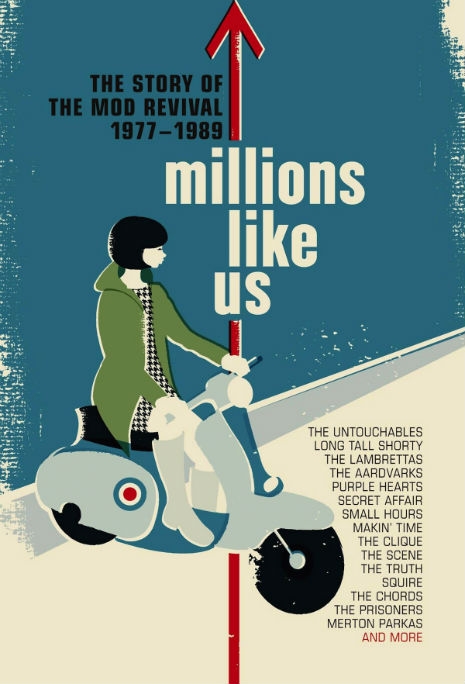
This is a guest post from Jason Toon
Forsaken by its godfather, derided by critics, dismissed by the music press that inflated it into a phenomenon in the first place: the late ‘70s “mod revival” never really became the Next Big Post-Punk Thing. It never produced another band with the depth, range, and wider appeal of its biggest inspiration, the Jam, let alone ‘60s originals like the Who, the Small Faces, and the Kinks. After boosting bands like the Chords, main Jam man Paul Weller took pains to distance himself from what he saw as an unimaginative horde of louts in parkas.
And yet… though its attempt to take punk’s short-hair-and-sharp-songs aesthetic back toward the ‘60s was commercially doomed, the mod revival left behind a pile of great singles. It laid the foundation for C86, garage rock, shoegaze and other strains of ‘80s UK indie that eventually coalesced into Britpop. And after the mainstream attention faded, mod went underground, where it has survived to this day.
Cherry Red’s new four-disc Millions Like Us: The Story of the Mod Revival 1977-1989 is the best document yet of the mod revival. It’s missing the Jam, and leaves out Two-Tone ska, which offered a more socially relevant (and danceable) way for the kids of the time to engage with ‘60s style. But paradoxically, it’s actually stronger for it: without anything that a non-enthusiast would ever have heard before, Millions Like Us feels like a pocket universe of unknown pop hits.
Of course, if you’re into this kind of thing, you’ll be familiar with much of the first two discs. Beyond the oft-anthologized high points like the songs above, Millions Like Us unearths some brilliant curiosities. In the irresistible chorus to “Three Bands Tonite”, the Directions call out two other bands by name (the Teenbeats and the Sta-Prest, both also included here) for wanting to bail out on a show when the PA was late in arriving. It’s a great, unexpected diss record.
After the major labels lost interest and the faddish element moved on, things got really interesting. Discs three and four showcase a much wider variety of styles than the more punk-influenced earlier stuff. Take Dee Walker’s wonderful neo-soul stomper “Jump Back!”:
Ed Ball was an original member of the Television Personalities, and continued to collaborate with head TVP Dan Treacy on various other projects, all grappling with the pop-cultural legacy of the ‘60s through naive, hyper-catchy songs. With his own band the Times, Ball released one great record after another over the past few decades, starting with a 1981 single that took its title from original ‘60s mods the Creation, “Red With Purple Flashes”:
The Creation also unwittingly bestowed a name upon another late-mod band, Makin’ Time. Their “Here Is My Number” is the pop-Motown hit the ‘80s needed but never found:
A couple of American bands show up on this otherwise very British affair, the best of which is the Untouchables with their sweaty ska-funk mover “Free Yourself”:
Ireland also gets a look in with the Blades, briefly seen as rivals of U2, but with a much less pompous take on stadium-scale anthems like “The Last Man in Europe”:
Former Prisoners organist James Taylor and his James Taylor Quartet brought Hammond-driven R&B instrumentals back to the mods with the 1987 single “Blow Up.” Taylor’s cover of Herbie Hancock’s theme to the 1966 Antonioni film could not have less to do with the anodyne American singer-songwriter of the same name. The JTQ became an acid jazz festival favorite and is probably pounding tunes like this out right now on some stage in New Zealand or Greece.
The last song on Millions Like Us, and the latest chronologically, leaves the story on the cusp of Britpop. The Aardvarks pay tribute to their favorite sci-fi writer with “Arthur C. Clarke,” from their thoroughly delightful 1990 album Bargain. It cops the music-hall psychedelic bounce of Sgt. Pepper’s and Village Green Preservation Society that bands like Blur and Supergrass would spin into gold just a few years later.
Millions Like Us isn’t all timeless brilliance. Some of the songwriting is generic. Some of the production is limp. Some of the sloganeering is obnoxious, especially from the would-be world-conquerors Secret Affair. But taken as a whole, it’s a fascinating collection of secret chartbusters, collected and handsomely packaged with impeccable attention to detail. In other words, very Mod.
This is a guest post from Jason Toon